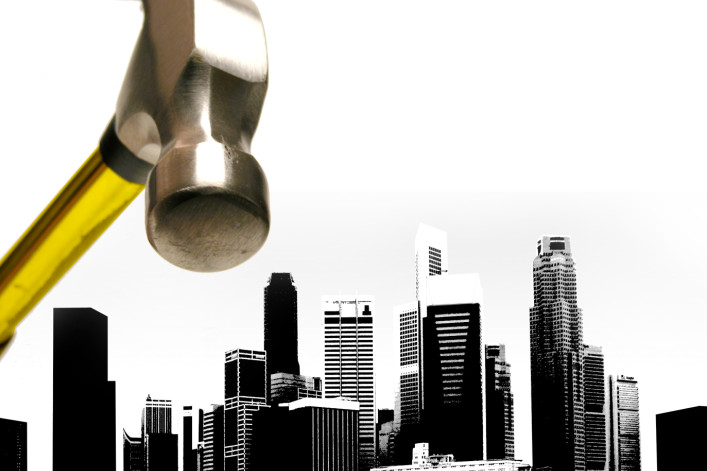NYC Renovation Chronicles: 6 steps to getting a work permit

The Situation
Your managing agent and/or architect says that to begin your renovation project you must obtain a work permit issued by the Department of Buildings (D.O.B.).
The bad news? The cost and time to complete your project just increased. The good news is that obtaining a work permit will minimize (but not eliminate) the risk that your renovation will not be built as per the city’s building code and increase the chance that your contractors will be fully insured, as the Department of Buildings often has more stringent insurance requirements than your building.
The Deal
1. How much does it cost to get a work permit?
A lot.
To obtain a work permit for the even simplest renovation, you will need to hire a New York State Registered Architect (R.A.) or Professional Engineer (P.E.) to prepare drawings of the existing conditions and proposed renovation. An expediter (a.k.a. Filing Representative) must then be hired to submit the drawings and associated paperwork to the D.O.B.
The department will charge you a percentage of the cost of the construction in fees. Even on the smallest of renovations you can expect to pay approximately $5,000 to obtain a work permit--broken down into at least $2,500 for an R.A. or P.E. to prepare simple drawings (do not expect high design), $1,800 for the expediter and $700 for the D.O.B. fees.
2. Can I circumvent the work permit requirement?
Sometimes; at other times it is impossible to avoid. If you live in a co-op or condo, and the managing agent mandates that you obtain a work permit to undertake the renovation, you must comply.
You can try to get around this requirement if you misrepresent the scope of work you are doing to the managing agent and perform the work without the necessary permits, but you are taking a huge risk.
If the D.O.B. catches you in the act, it will place a stop-work order and fine you several thousands of dollars at a minimum. Your project can be frozen for months and you may end up paying an R.A. or P.E. much higher fees than you would have if you hired them to obtain a work permit in the first place.
The board of your building may also use such fraudulent acts as a reason to cancel your proprietary lease and force you to sell your apartment.
3. How long will it take to obtain a work permit?
Longer than you would like.
An R.A. or P.E. will take anywhere from a week to several months to prepare drawings for your project, depending on the scope. The R.A. or P.E. can then self-certify the drawings, shortening the approval process, or have them reviewed by a plan examiner at the D.O.B.
Once a plan examiner reviews the drawings, he or she will often find at least one edit to be made. Having the R.A. or P.E. make a simple edit to the drawings and resubmit them to the plan examiner should take only a few days. It could be weeks, however, before the plan examiner reviews them again. If that review results in another edit, the whole process starts again.
4. How can I check the status of my work-permit request?
On the D.O.B. home page there is the Building Information System (BIS) where you can type in your address and see the status of your request to obtain a work permit. The D.O.B. will show updates, such as when the drawings were filed, when the plan examiner reviewed them and if they are approved.
Once your renovation is under way, you can also use the BIS system to see if someone has lodged a complaint to 311 (the complaint telephone line) about your project.
5. The D.O.B. approved my plans. Now what?
The next step is for your licensed contractor to go to the D.O.B. (most contractors employ expediters to do this) and obtain the work permit. On jobs where there is plumbing or electrical work, these subcontractors will also have to go to the D.O.B. to obtain permits.
The contractors must have up-to-date insurances on file, which gives a level of protection to you, the homeowner. No work can begin before a copy of the work permit is prominently displayed at the job site.
6. My project is done. What’s left?
Go back to the D.O.B. Now that your project has been completed, the work must be inspected by your R.A., P.E. or D.O.B. inspector, depending on the scope of work. Generally, larger more complex jobs (such as changing a certificate of occupancy) mandate that a city inspector approves your completed project.
On smaller jobs (a bathroom renovation, for example) your R.A. or P.E. can perform the inspection. If the plumber or electrician had to obtain work permits for their trade, they may also have their work inspected.
Once all the necessary inspections have been conducted, the expediter will submit the inspectors’ reports, and your job can be closed out.
Yoel Borgenicht is the president of King Rose Construction, specializing in residential and commercial renovations in the New York City metro area.
See all NYC Renovation Chronicles.
Related posts:
Expediters: A profession built on a Kafka-esque nightmare
NYC Renovation Chronicles: Choosing the perfect contractor
BrickUnderground's Renovation Survival Kit























